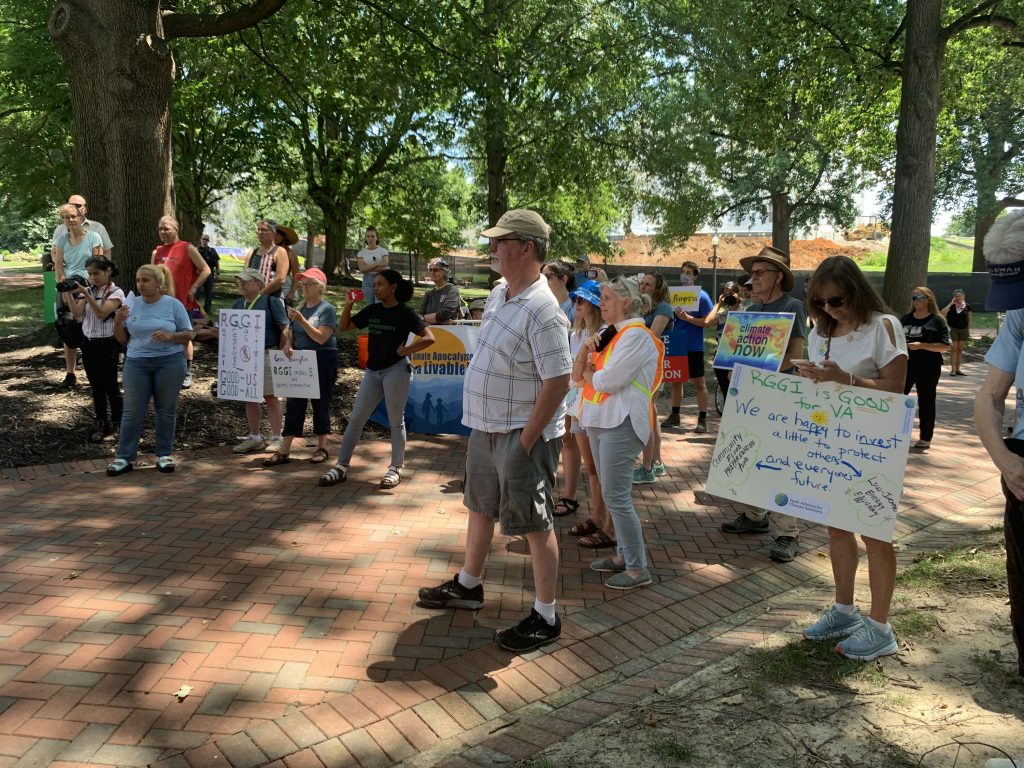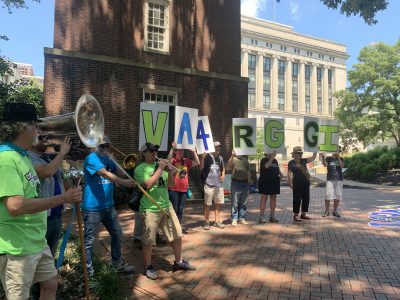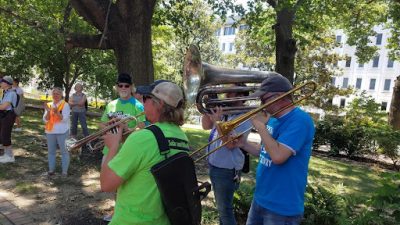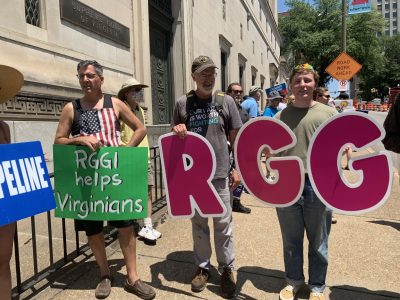Front Porch Blog

Participants in the Backwards March to support Virginia’s involvement in the Regional Greenhouse Gas Initiative listen to speakers explain the benefits of the program. Photo by Jen Lawhorne
Virtual rally for RGGI!
Gov. Glenn Youngkin wants to remove Virginia from the Regional Greenhouse Gas Initiative, a program that has provided millions of dollars for energy efficiency and flood prevention programs while incentivizing polluters to cut carbon emissions.
Join us on Wednesday, Aug. 3 at 6 p.m. to learn about the threats facing RGGI.
Then call Youngkin’s office to tell him why the program is so important for Virginia!
By Finn Pollard
Virginia Grassroots Organizing Assistant
Appalachian Voices
On July 1, I attended a unique event — a “Backwards March” in Richmond, Virginia. Participants met by the bell tower on the capitol grounds, only a thousand feet or so from where legislators just two years prior had voted to join Virginia to the RGGI — the Regional Greenhouse Gas Initiative. We gathered to show our discontent with Gov. Glenn Youngkin’s attempts to roll back environmental regulations, RGGI included.
Before the rally, I understood RGGI to be a collective effort between states to limit the amount of pollution emitted by power plants. In essence, this is correct, but I didn’t understand why it was important to the day-to-day life of Virginians other than helping to diminish the effects of climate change. As the speakers from various organizations explained how it took years of effort, by many of the same people there, to get Virginia to join RGGI, I started to see.

Marchers rallied support for Virginia’s continued participation in the Regional Greenhouse Gas Initiative. Photo by Jen Lawhorne
Speakers from different organizations including Chesapeake Climate Action Network and Virginia Interfaith Power & Light explained Virginia was finally able to join RGGI with the passage of a much larger bill in 2020 called the Clean Energy and Community Flood Preparedness Act. But Governor Youngkin has made a concerted effort to roll back a lot of important climate initiatives, RGGI included, and this is why we were walking backwards. It was symbolic of the rollback on climate progress that was happening in Virginia.

A brass band helped liven the scene during the march. Photo by Jessica Sims
Still the question remained, “how does RGGI help Virginians in their day-to-day life besides helping prevent large scale climate catastrophe?” Kidest Gebre from Virginia Interfaith and Power & Light spoke about how the money utilities spend on allowance goes directly to communities. It helps to lower energy bills and to make buildings more energy efficient, which results in lower utility bills. Lower utility bills mean more money for households to put back into the economy. And more energy-efficient housing means less energy is needed from large carbon-emitting power plants, which means the power plants will need to buy fewer allowances. Participation in RGGI also brings revenue into the Community Flood Preparedness Fund, which helps with flood prevention and resilience efforts. Being a part of RGGI allows Virginia to be a part of a positive feedback loop. Gebre said that in the first year Virginia has officially been in RGGI there has been astronomical success, including hundreds of millions in funding for flood protection and low-income energy efficiency programs.

Finn Pollard helps spell out RGGI during the Backward March. Photo by Jen Lawhorne
When we first started marching backwards, I was embarrassed. I’m sure we looked rather silly, to say the least, but no one else seemed to care. I think we knew that our participation in such a visually unique scene would help passers-by see our commitment and prompt them to wonder what inspired this mid-day parade. Maybe they’d want to learn more about the governor’s efforts to roll-back environmental and climate progress that helps the people in their day-to-day life.
RGGI might be seen as a niche issue by some, but it helps so many people. It seemed everyone there was committed to doing their best to ensure Virginia remains in RGGI and committed to climate progress, affordable energy bills, and flood preparedness.
Someone yelled into their megaphone. “What do we want?” The crowd responded enthusiastically: “To stay in RGGI! To stay in RGGI!”
PREVIOUS
NEXT
Related News

Leave a comment
Your email address will not be published. Required fields are marked *
